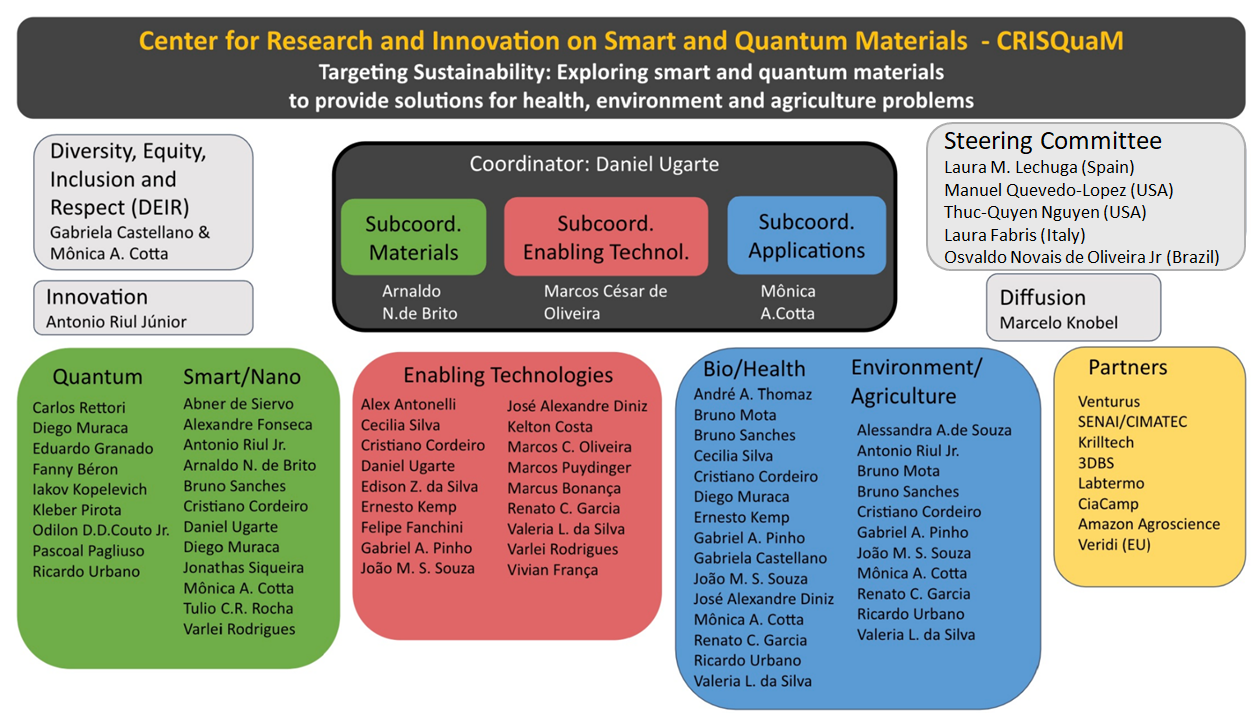BV-FAPESP: research projects supported in this Center
CRISQuaM in the Media: news about the center
CRISQuaM aims to explore the synergistic development of fundamental and applied science to create new materials with high potential for the construction of devices and sensors to address technological challenges related to sustainability, climate change, precision agriculture, ecology, and health. To achieve these goals, we have assembled an interdisciplinary and collaborative research team, integrating expertise across various scientific domains, researching novel materials with high innovation potential. By combining original synthesis methods, advanced characterization techniques, theoretical approaches, computational simulations, quantum technologies, and device construction designs, we aim to drive advances in smart and quantum materials, promoting scientific excellence and technological development. With this, we plan disruptive innovations in instrumentation—including hardware and AI-based tools—as well as in quantum technologies, biomedical devices, and signal processing, in addition to plant bionics, exploring plant-pathogen interactions. Besides research activities, we plan intensive actions in education, dissemination, and communication for the general public, as a modern society should be aware of the challenges humanity faces and how research and technology are essential for responsibly utilizing the planet's limited resources. CRISQuaM's Innovation activities are accelerated through partnerships with several companies in related technologies, many of them Brazilian. Finally, all activities of the Center are managed in accordance with diversity, equity, and inclusion goals and best practices.
The Center brings together scientists, engineers, and innovators in a collaborative effort to apply materials science and quantum technologies at the cutting edge, designing new materials and nano(bio)sensors for advanced diagnostics. The Center has a team capable of producing a wide range of (nano/micro) materials, along with precise chemical and physical characterizations using modern techniques (synchrotron, advanced microscopy, magnetotransport, magnetic resonance, optics, etc.). In addition, the team offers various options in enabling technologies, including miniaturization, processing, and additive manufacturing, as well as instrumentation, quantum sensing, and electronics development. Data analysis will employ updated approaches (numerical simulation, classical and quantum machine learning, and quantum optimization). Applications at the knowledge frontier will address urgent sustainability needs in environmental areas, precision agriculture, plant bionics, and biomedical interfaces, contributing to the development of local technologies in close partnership with the Brazilian industry.
The organization of the Center is based on three pillars — Materials, Enabling Technologies, and Applications — together with partner companies, as described in the figure below.

2024-12-11
Portable device developed by a FAPESP-supported startup allows for the preventive detection of changes and the treatment of the material so that it remains suitable for use; company participated in business mission during FAPESP Week Spain.
2024-12-11
For Elena Fernandez de la Iglesia, from the Faculty of Law at the Complutense University of Madrid, taxing producers and consumers according to the amount and type of material used is one of the best tools for promoting the circular economy. The topic was discussed during FAPESP Week Spain.
2024-12-10
A study conducted by a Brazilian researcher at Harvard shows that serotonin – a hormone known for regulating mood – plays a central role in the development of postprandial hypoglycemia in up to 30% of people who have undergone surgery; the findings suggest avenues for possible treatments.
2024-12-10
A study by a group of scientists shows that larval infestations of Aedes aegypti in open-air disused containers increased in response to the effects of the weather phenomenon, especially mean seasonal temperature and rainfall above 23.3 °C and 153 mm respectively.
2024-12-09
The study involved 2,788 participants with impulse control disorder treated at the University of São Paulo’s general and teaching hospital in Brazil. According to the authors, in these cases, health workers should assess not only explicit suicide attempts but also other kinds of life-threatening behavior.
2024-12-04
The pioneering initiative by scientists at the University of São Paulo aimed to promote early diagnosis and improve treatment of the disease, which is relatively infrequent but one of the leading causes of death from cancer in Brazil.